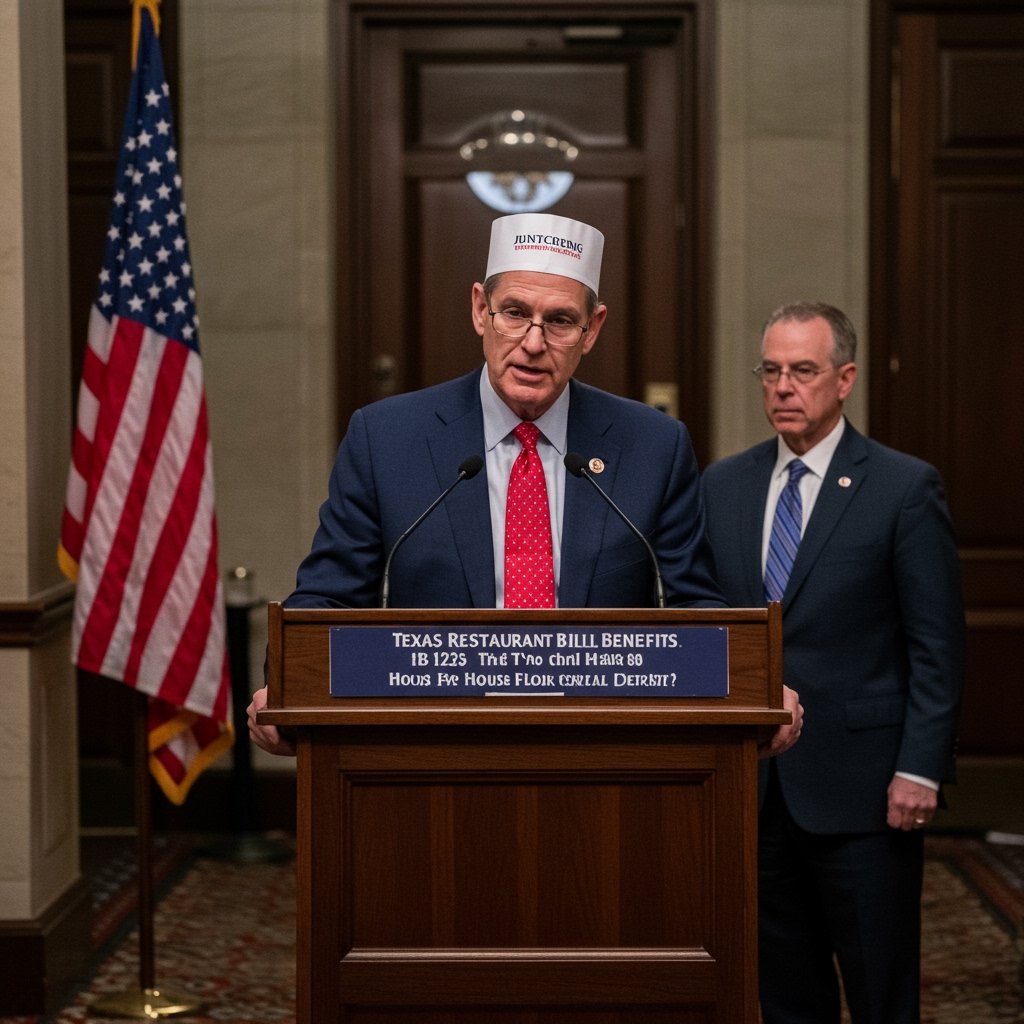HB 123: Texas Restaurant Benefits Bill Advances to House Floor for Crucial Debate
A legislative proposal poised to significantly reshape labor practices within the Texas restaurant industry is set for a critical juncture. House Bill 123 (HB 123), a measure that seeks to implement sweeping changes to employee benefits, including mandates for paid sick leave and adjustments to minimum wage standards for workers who earn tips, is slated for a full and extensive debate on the floor of the Texas House of Representatives on February 28th. This upcoming debate represents a pivotal moment for the bill, following its recent, hard-fought advancement from a key legislative committee.
The journey of HB 123 through the legislative process has been marked by intense deliberation and deeply divided opinions among stakeholders. Its most recent hurdle was cleared on February 26th, when the bill was voted out of the House Business & Industry Committee. The committee vote was notable for its narrow margin, reflecting the contentious nature of the legislation and the sharp divisions it has created across the state. The path through the committee involved hours of public testimony from a diverse array of voices, including representatives from major industry groups, individual restaurant owners, restaurant employees, and advocates from labor organizations. The testimony was often described as contentious, with impassioned arguments presented by both proponents and opponents regarding the potential consequences of the bill’s passage.
Key Provisions Stirring Debate
At its core, HB 123 targets two primary areas of employee compensation and benefits: paid sick leave and the minimum wage structure for tipped workers. The proposed mandatory paid sick leave provision would require restaurant employers statewide to provide their employees with a certain amount of paid time off to be used for illness or caring for a sick family member. Proponents argue this is a fundamental labor protection, providing a safety net for workers in a physically demanding industry and helping prevent the spread of illness within establishments. Under typical proposals of this nature, employees would accrue sick leave hours based on the number of hours they work, similar to how vacation time is sometimes earned, ensuring even part-time workers build some level of protection over time.
The second major component involves adjusting minimum wage standards for tipped employees. Texas, like many states, currently allows employers to pay tipped workers a lower direct wage (a “subminimum wage”) than the standard state minimum wage, with the expectation that tips will bring the employee’s total compensation up to or above the minimum wage level. This system relies heavily on the unpredictable nature of customer gratuities. HB 123 proposes changes that could potentially alter this “tip credit” system, potentially increasing the employer’s direct wage obligation to tipped staff. Supporters of this change argue it provides more stable and predictable income for workers, reducing their reliance solely on tips and offering a more secure financial foundation.
Industry Opposition: Warning of Economic Impacts
The legislative effort has encountered robust opposition from various segments of the business community, most notably the Texas Restaurant Association (TRA). The TRA has positioned itself as a staunch opponent of HB 123, articulating significant concerns about the potential negative repercussions should the bill become law. Their primary argument centers on the predicted devastating economic impacts on businesses, particularly small businesses that operate on often-thin profit margins.
The Association warns that imposing mandates such as paid sick leave and increasing direct wage costs for tipped staff would result in substantial new expenses for restaurant owners. These increased costs, they argue, would be difficult for many establishments, especially independent and family-owned restaurants, to absorb without making difficult operational decisions. Potential consequences highlighted by the TRA include the possibility of reduced staffing levels, cuts to employee hours, delaying or foregoing necessary capital investments, increasing menu prices for consumers, and in severe cases, even leading to business closures. The TRA maintains that the current system, while not perfect, allows for flexibility and market-driven compensation, where successful employees can often earn well above the minimum wage through tips. They argue that state mandates could stifle this economic dynamic and place an undue burden on employers, hindering job creation and economic growth within the sector.
Labor Advocacy: A Call for Fair Practices and Stability
Conversely, the push for HB 123 is strongly supported by labor organizations and worker advocacy groups, including the Texas Restaurant Workers Alliance. These groups view the bill as a critical and vital step towards establishing fair labor practices across the state’s large and essential food service workforce. They contend that the current system leaves many restaurant employees vulnerable, lacking basic benefits and facing income instability.
The Texas Restaurant Workers Alliance and its allies argue that mandating paid sick leave is not just a matter of fairness but also public health. They point out that workers without paid leave are often forced to choose between losing a day’s pay and working while sick, potentially exposing colleagues and customers to illness. They see this as a necessary protection for the health and safety of both workers and the dining public. Regarding the tipped wage provisions, proponents argue that reducing or eliminating the tip credit and requiring a higher base wage from employers would provide much-needed income stability. They highlight that fluctuations in customer traffic and tipping habits can lead to unpredictable earnings for workers, making it difficult to manage personal finances, secure housing, and maintain overall economic security. The Alliance emphasizes that a more stable and equitable compensation structure is essential for ensuring the long-term stability for the state’s food service workforce, reducing high turnover rates often seen in the industry, and ultimately benefiting the entire sector by creating a more professional and secure career path for restaurant employees.
The Road Ahead: House Floor Debate on February 28th
With the bill successfully navigating the committee stage, albeit narrowly, the focus now shifts entirely to the full Texas House of Representatives. The scheduled debate on February 28th is expected to be robust and potentially lengthy, mirroring the intensity witnessed during committee hearings. Legislators will have the opportunity to discuss the bill’s merits, propose amendments, and ultimately cast votes that will determine its fate in the House.
The debate will likely see representatives echoing the arguments put forth by the various stakeholders, weighing the concerns of business owners against the welfare and stability of the workforce. The outcome is uncertain, given the bill’s narrow passage in committee, suggesting a divided House on the issue. Success in the House would send the bill to the Senate, where it would face further scrutiny and debate. Defeat on the House floor, or failure to bring it to a vote before key deadlines, would likely end its prospects for the current legislative session.
For the thousands of restaurant owners and hundreds of thousands of restaurant employees across Texas, the debate on February 28th holds significant consequences. It represents a potential turning point for labor standards in one of the state’s most visible and economically important sectors, underscoring the ongoing tension between business viability and worker protections. All eyes will be on the House floor as lawmakers deliberate on a bill that could fundamentally alter the landscape of restaurant employment in the Lone Star State.






